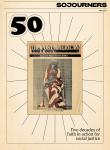THE BIBLE IS about scrappy people. We read about communities that pass along wisdom, from one generation to the next, on how to survive (despite the violence that threatens their existence) and on faith in God, which keeps their hope alive. We worship the God of Exodus who leads people out of oppression. I believe in God’s ongoing work of liberation. However, the Exodus shouldn’t be the only lens through which we discern God’s action in our world. When the version of liberation found in Exodus becomes our central frame to recognize the characteristics of God’s presence, we occlude from our vision the Spirit’s prosaic and laborious provisions of survival.
In her landmark Sisters in the Wilderness: The Challenge of Womanist God-Talk, theologian Delores S. Williams turns our attention to the witness of Black women who create communities of survival. She writes about the “art of care” and the “art of connection” as survival strategies of Black women. Her guide is Hagar, a biblical character who struggles to piece together life in the wilderness after Abram and Sarai—with God’s sanction—banish her from their household. “We can speak of Hagar and many African American women as sisters in the wilderness struggling for life,” Williams explains, “and by the help of their God coming to terms with situations that have destructive potential.”
Our scriptures this month don’t imagine spectacular visions of liberation. Instead, they invite us to live out our hope within the wilderness—with Williams and Hagar—as we become people of refuge. We pass along God’s grace in our arts of survival and mutual care.
November 7
Need as gift
1 Kings 17:8-16; Psalm 146; Hebrews 9:24-28; Mark 12:38-44
THE PLOTLINE OF the book of 1 Kings tells story after story about the exploits of kings. In chapter 17, however, with Israel in disarray under King Ahab’s reign of terror, the narrator abruptly turns our attention from the heights of royal power to the plight of the lowly. “Go now to Zarephath,” God says to the prophet Elijah, “for I have commanded a widow to feed you” (verse 9).
God leads Elijah to live among peasants. While Elijah’s world falls apart, his home country in disorder, God sends him to a widow in a foreign land. The prophet’s mission is to ask the poorest of the poor for food and drink. “I have nothing,” she says upon Elijah’s arrival, only “a handful of meal ... and a little oil” (verse 12). Elijah presents his neediness to a needy woman, his dependency to someone with nearly nothing left to give.
In his book Rethinking Generosity, political theorist Romand Coles explores the dynamics of giving and receiving, how the powerful enact their dominance through benevolence: as patron, host, philanthropist; always the giver, never a recipient. “When generosity becomes separated from receptivity,” Coles writes, “it tends toward imperialism.” Without genuine relationship, charitable acts may establish a person more within the social class of the generous, people without needs. Coles quotes German philosopher Friedrich Nietzsche: “The heart and hand of those who always mete out become callous from always meting out.” The generous become hardened, protected from receiving from others, shielded from a recognition of dependency.
To heal the givers from callousness, Coles points toward the “mutual transfigurations” that happen when we recognize the gifts of others, that all of us are held in a social web of provisions and dependencies—a gift of life shared in our receiving and giving. In 1 Kings 17, Elijah learns how to receive. The widow becomes the provider, the benefactor, the one who mediates the hospitality of God.
November 14
Refuges of care
Daniel 12:1-3; Psalm 16; Hebrews 10:11-25; Mark 13:1-8
“DO YOU SEE these great buildings?” Jesus points to the temple in Jerusalem, a holy place central to his faith. “Not one stone will be left here upon another; all will be thrown down” (Mark 13:2). Jesus is a political realist. He has discerned the signs of the times. He sees the portents of a catastrophe. Rebellion against Roman occupation was simmering; Jesus knows the pot will soon boil over. As the temple falls, the world begins a slow collapse: “earthquakes and famines, tremors like birth pangs,” Jesus foretells, and “nation will rise against nation” (verse 8).
As Trump’s presidency unleashed ethnonationalistic terrors, I listened to Paul Cooper’s Fall of Civilizations podcast. Each episode tells the story of a historic civilization in collapse: the Han dynasty of ancient China, the thousand-year dominion of Byzantium, the Khmer Empire of medieval Cambodia, the Incas of the Andes, and others. Cooper captures the moments when a people realized that this is the end of their society—the staggering experience of the beginning of the end. The stories were a strange comfort to me as Trump’s federal policies ravaged our local communities—to know that I wasn’t alone, that we weren’t alone. History has been a long chain of catastrophes. Remnants of social life appear after the end.
You and I have arrived on the scene in the wake of disasters. Our lives are built on the wreckage of the past. “This is but the beginning of the birth pangs,” Jesus warns his friends (verse 8). Violence recycles through history. The psalmist gives us guidance for use in every generation: “Protect me, O God, for in you I take refuge ... my body rests secure” (Psalm 16:1, 9). In our tumultuous times, we extend God’s refuge to each other, the church as a community where our bodies rest secure in God. Birth pangs signal our time to become homemakers, ready to welcome life into refuges of care.
November 21
We are Pontius Pilate
Daniel 7:9-10,13-14; Psalm 93; Revelation 1:4-8; John 18:33-37
THIS PASSAGE FROM John’s gospel recounts the interrogation of Jesus by Pontius Pilate, governor of Roman Judea—a judicial review that leads to Jesus’ condemnation and death. The Apostles’ Creed remembers Pilate as the enemy par excellence of Jesus: He “suffered under Pontius Pilate.” Jesus Christ is a victim of Pilate’s violence. The creed does not let us forget that the crucifixion happens at Pilate’s command. His name is named; blame is assigned.
I have a list of people who I would names as enemies, and some who would recognize me as their enemy: for example, the police who arrested me and other community members when we blocked U.S. Immigration and Customs Enforcement agents from deporting a friend. An ICE field office director identified us as enemies and had us jailed so he could conduct the violence of a state-sponsored kidnapping. I’d like to think of the ICE agent as in similar position to Pilate, and my deported friend as his victim—and, due to our community defense efforts, myself counted among the collateral victims, all of us becoming enemies of ICE.
All that is true. And I know that biblical narratives twist and turn on us. One moment we think we’re the kind of people whose justice work puts us in solidarity with Jesus; the next moment we see ourselves in the disciples who betray him. John 18 prods us to consider how we’re like Pilate—a passage to expose the Pilate inside each of us.
“In slaying him,” Ralph C. Wood expounds on the creed, “Pontius Pilate serves as our representative.” Pilate doesn’t personally nail Jesus to the cross, yet he’s named as the one responsible for the crucifixion. I haven’t committed gruesome violence, yet my U.S. citizenship marks me as a beneficiary of the military’s terrors abroad. I’d prefer to consider myself as an enemy to colonialism rather than a member of a settler colony. So, I wash my hands.
As for Pilate: The Ethiopian Orthodox Church believes that Pilate and his wife, Claudia Procula, became believers in The Way after the resurrection appearances and later were martyred for their faith.
November 28
Advent Waiting
Jeremiah 33:14-16; Psalm 25:1-10; 1 Thessalonians 3:9-13; Luke 21:25-36
ADVENT IS A season of waiting: four weeks to remember the anticipation of that first Christmas, the expectation of the birth of Jesus. To wait on God—that’s the heart of our faith. We are people who live in expectation of God’s advent in our lives and in the world.
The Bible, from the first page to the last, reads like a book about waiting—for the promised land, for the end of exile, for the Messiah, and, in the concluding chapter, in the book of Revelation, waiting for the day of judgment and Christ’s return. “Come, Lord Jesus” we read in the final verses of the Bible (Revelation 22:20). The end of the book is about waiting, about calling out to Jesus to come back, to save us from what we’ve done to God’s world.
To wait for salvation is a consistent theme in the Psalter, the heart of the Bible. “You are the God of my salvation,” the psalmist prays, “for you I wait all day long” (Psalm 25:5). In these verses of our psalm, we hear the ache of hope, the psalmist calling out for God to take notice of our human condition, our plight. “Be mindful of your mercy ... remember your steadfast love” (25:6). The psalmist longs for salvation, for God’s mercy and love.
During Advent we discover that the wait is bearable, the longing tolerable, the ache sufferable, because God waits with us. The promise revealed in Advent is that God submits to Mary, that God trusts Mary, that God waits inside a human life. And if God waited with Mary, then we trust that God now waits with us, the gospel inside of us, the promise of God’s life within ours.

Got something to say about what you're reading? We value your feedback!

